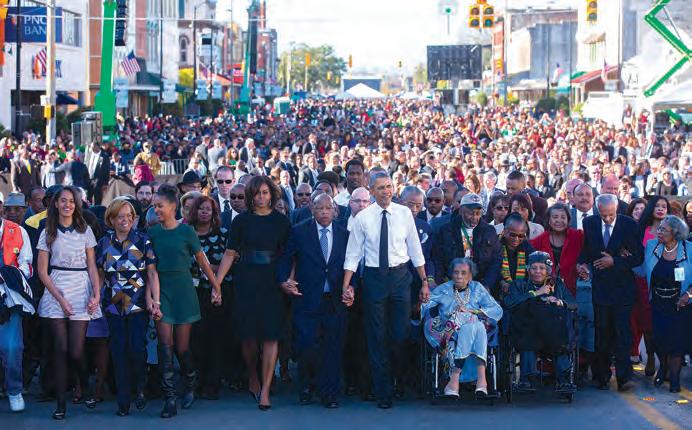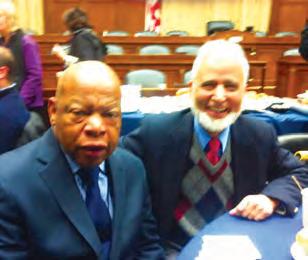
7 minute read
The Lessons Muslim Americans Should Take from Rep. John Lewis
BY EDWARD AHMED MITCHELL
President Barack Obama, Rep. John Lewis (center), First Lady Michelle Obama and daughters Sasha and Malia flank grandmother Marian Robinson. They are waiting, along with former President George W. Bush and former First Lady Laura Bush, to walk across the Edmund Pettus Bridge to commemorate the 50th Anniversary of the Selma to Montgomery civil rights marches, in Selma, Ala., on March 7, 2015. Former foot soldier Amelia Boynton Robinson, 103 years old (second from left). (Official White House Photo by Lawrence Jackson)
Advertisement
In the twenty-four hours after President Trump announced his first Muslim Ban on Jan. 27, 2017, thousands of protesters descended upon airports across the country.
At that time, I was a civil rights attorney serving as executive director of CAIR’s Georgia chapter. When I arrived at Atlanta’s Hartsfield-Jackson International Airport, I expected to find a small crowd of Muslim demonstrators cordoned off by Atlanta police officers.
I was in for a surprise. Despite being one of the world’s largest and busiest airports, I had never seen a crowd like this. A sea of people — thousands of them — had forcibly taken over the airport’s outdoor arrivals area.
Even more surprising — people who came to show solidarity with us vastly outnumbered the Muslims in the crowd. The rainbow crowd of Georgians carried all manner of signs produced in short order: “Muslim & Proud,” “Let Them In” and “No Ban, No Wall.”
After navigating my way to an elevated spot with other speakers, I noticed a ripple
President Obama hugs Rep. John Lewis after his introduction. (Official White House Photo by Pete Souza)

run through the crowd. A group of protesters suddenly parted in a straight line, creating a narrow pathway.
That’s when I noticed the man working his way through the crowd. Although I could only see his broad shoulders and the top of his head, I knew I was looking at Rep. John Lewis (D-Ga).
Rep. Lewis, then about 77 years old, had shown up to demand answers from immigration officials about missing and detained travelers.
After hours spent inside dealing with tight-lipped immigration officers, he made his way into the thick of the crowd outside. As protesters nearby recognized the legend in their midst, they stepped back, parting like the Red Sea, and began applauding.
As I look back on that day, a thought occurs to me: John Lewis didn’t have to be there. He could have stayed home, directed his staff to issue a statement condemning the Muslim Ban and then watched the protests unfold on CNN. No one would have noticed or faulted him.
Between risking his life at segregated lunch counters, aboard freedom rides and on the Edmund Pettus Bridge, John Lewis had done enough protesting to last a lifetime. His work had already paved the way for generations, including new Muslim immigrants and the descendants of indigenous African-American Muslims, to live more freely. He didn’t owe Muslim Americans or anyone else in our country more of his time.
But there the congressman was at Hartsfield-Jackson airport, big as life. That wasn’t the last time we saw him on the frontline late in his life. From issues of gun violence to immigration, he showed up again and again to share words of wisdom and encourage protesters to get into “good trouble.” He made his last public appearance just weeks before his death at the Black Lives Matter mural painted on the street leading to the White House.
As Muslim Americans and other communities carry on their respective fights to protect their rights in the face of resurgent bigotry, we should take at least two lessons from John Lewis’ life.
First, our entire community — not just activists — must recognize that fighting injustice does not begin and end with Islamophobia or other matters that uniquely impact Muslims.
After the Civil Rights movement achieved its major goals, John Lewis didn’t pat himself on the back, retire and forget about everyone else. Instead, he continued to advocate for the Black and other communities impacted by racial discrimination, economic inequality, American military adventures overseas and other issues.
Many Muslim activist organizations have already taken this lesson to heart by playing a major role in the fight against racist
A Remembrance
ISNA PRESIDENT DR . SAY YID Muhammad Syeed remembers his meetings with Rep. John Lewis, especially during his time as national director of ISNA’s Office for Interfaith and Community Alliances on Capitol Hill.
Dr. Syeed said that Rep. Lewis was a very unique person, one who “continued to fight tirelessly against injustice till his last days of life,” adding ”May God reward him for his sacrifices and lifelong commitment to justice.”
He once told Rep. Lewis that “we were like twins,” born the same year and being jailed for advocating for human rights and their peoples’ dignity — he for a short period, and Dr. Syeed for two years in an Indian jail.
He informed Rep. Lewis of how his people, the Kashmiris, had been bought and sold against their will and that he had been born into a Muslim-majority Kashmir ruled by an absolute Hindu ruler. In fact, that ruler’s great-grandfather had purchased the princely state — comprising 85,000 sq. miles and 2 million inhabitants — from the British colonial rulers in 1846. The deal included payment of “one horse, twelve shawl goats of approved breed (six male and six female) and three pairs of Cashmere shawls.”
police brutality, the abuse of immigrants at the border and violence against women, among many other causes.
But we can all do more, especially community organizations and houses of worship. We must care as much about the injustices here as we do about the injustices committed abroad.
We must also ensure that we don’t limit the scope of our activism to issues advocated and sanctioned by one side of the political spectrum. If the political causes we’re willing to raise line up perfectly with the political issues raised by liberals or conservatives, then something is wrong.
As Rep. Lewis said, “When you see something that is not right, not fair, not just, you have to speak up. You have to say something; you have to do something.”
Every Muslim should recognize a similarity to the words of Prophet Muhammad (salla Allahu ‘alayhi wa sallam): “Whosoever of you sees an evil, let him change it with his

9th Annual ISNA-CISNA West Coast Education Forum
Dr. Syeed reminisces that Rep. Lewis was amazed upon learning about how an entire nation had been enslaved. Dr. Syeed then recited the poet-philosopher Mohammad Iqbal’s verses about this deed: “Their fields, their crops, their streams, / Even the peasant in the vale, / They sold, they sold all alas, / How cheap was the sale.”
Dr. Syeed — who crossed the Pettus bridge [ironically named for a Confederate general] with him on the 50th anniversary of the Selma to Montgomery march in 2015 — remarked that Rep. Lewis’ peaceful struggle has a universal appeal for Muslims and that he was popular among those Muslim youth fighting against Islamophobia. ih
hand; and if he is not able to do so, then [let him change it] with his tongue; and if he is not able to do so, then with his heart — and that is the weakest of faith” (“Sahih Muslim,” hadith no. 49).
As for the second lesson, we should remember that Congressman Lewis was not just an activist, but a faith-based activist. Although Lewis never became a minister, he was a graduate of American Baptist Theological Seminary and received a degree in religion and philosophy from Fisk University. His faith inspired and informed his civil rights activism.
The same is true of many of the Civil Rights movement’s most prominent leaders, including the reverends C.T. Vivian, Joseph Lowery, Ralph David Abernathy and, of course, Dr. Martin Luther King (not to mention Muslim civil rights leaders like Malcolm X).
Their faith inspired their words, their goals and their tactics, including the use of
October 9 – 10, 2020 Santa Ana, CA

Contact Email: info@isna.net or Call: (317) 839-1825
nonviolence. Nonviolence was not just a strategic decision for John Lewis, but a moral decision dictated by his understanding of his faith: “I believe in nonviolence as a way of life, as a way of living.”
Today, a few too many Muslim activists have separated political activism from religion. If we truly believe in God, then God should guide both what we advocate for and how we advocate for it. That is, our words, our goals and our tactics. Faith without activism is arguably deficient, but activism without any faith is almost certainly dangerous.
Over the past several days [after he passed away], many American leaders have issued public statements memorializing Rep. Lewis, including quite a few politicians who have dedicated their careers to undoing the civil rights work that he did.
As Muslims, we should not simply issue token or empty remembrances, but rather reflect upon and replicate the work that God allowed him to do.
No leader in our time is perfect, but we can learn something from every one of them, especially Congressman John Lewis. May God guide his family, preserve the good he did and allow us to carry on the fight for justice. ih








